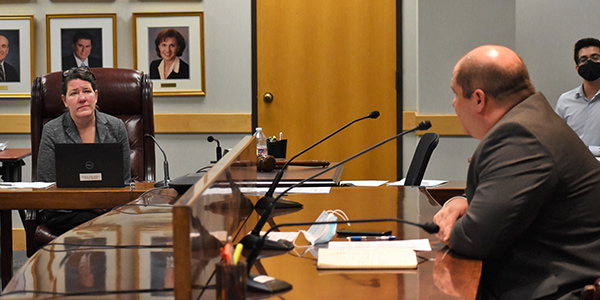The U.S House of Representatives’ principal oversight committee on Wednesday joined the roster of agencies investigating ERCOT following last month’s severe winter storm that plunged more than 4 million Texans into darkness for several days and left 14 million without water.
The Committee on Oversight and Reform’s Subcommittee on Environment sent a letter to ERCOT CEO Bill Magness requesting information and documents regarding the grid operator’s “lack of preparation” for and response to the storm and its “preparedness for future storms.”
The subcommittee said it is concerned “that the loss of electric reliability and the resulting human suffering, deaths and economic costs, will happen again unless ERCOT and the state of Texas confront the predicted increase in extreme weather events with adequate preparation and appropriate infrastructure.”
The storm and the ensuing blackouts could wind up causing as much as $90 billion in damage.
“Extreme winter weather events in Texas have occurred repeatedly over decades and ERCOT has been unprepared for them,” subcommittee Chair Ro Khanna (D) wrote in the letter.
ERCOT is already under investigation by its regulator, the Public Utility Commission of Texas and the state attorney general’s office. FERC and NERC have also opened a joint inquiry into the grid’s operational issues during the event, as they did after cold weather in 2011 that resulted in a similar round of rolling blackouts.
Khanna promised an investigation last month, telling CNN, “We will get to the bottom of this.”
“This was an anticipatable problem,” he said. “Ten years ago they had the same issue. Why did they not weatherize their equipment? Why did they not take appropriate regulatory action?”
As Magness told state legislators during more than 10 hours of testimony last month, ERCOT collects weatherization plans and emergency operations plans from generators but does not have enforcement authority over their weatherization practices. Sub-freezing temperatures and ice knocked out more than 52 GW of the ISO’s generation at one point, or nearly half of its installed capacity. (See Texas Lawmakers Dig into Power Outages.)
On Monday, the ISO said it had received multiple inquiries from resource entities on how they should submit their updated plans, as required by the grid operator’s protocols.
The subcommittee asked for all documents relating to preparations for an extreme winter weather event dating back to 2010, including:
- details on every generator that failed;
- all communications between ERCOT and the PUC, Texas Gov. Greg Abbott and any other state or federal staff referring to causes for outages and/or preparations for future extreme weather events;
- all documents relating to decisions on the rolling blackouts; and
- all documents on the 1989 and 2011 outages.
The materials are due March 17.
In a statement, ERCOT said, “We received the letter and will be providing responses.”
The Oversight committee has broad authority to investigate “any matter” at “any time” under House rules. The environmental subcommittee’s jurisdiction includes global climate change, public health and regulatory affairs.
PUC Proceeds Without its Chair
In its first open meeting since Chair DeAnn Walker’s resignation Monday, the PUC voted to direct ERCOT to claw back ancillary services (AS) payments from generators for service that went undelivered during the outages.
Carrie Bivens, executive director of the ISO’s Independent Market Monitor, filed a letter with the commission Monday noting a number of instances where AS, contracted in advance, was not provided in real-time because of the forced outages or reduced available capacity.
Bivens recommended that ERCOT invoke a “failure to provide” settlement treatment for AS not provided in real-time during the Feb. 14-19 operating days, thus producing “market outcomes and settlements consistent with underlying market principles.” She also recommended repricing the Feb. 15-20 operating days’ day-ahead AS clearing prices and capping them at the system-wide offer cap of $9,000/MWh.
Commissioners Arthur D’Andrea and Shelly Botkin saved the latter discussion for their next open meeting on Friday.
The PUC also terminated the use of the low system-wide offer cap, which was replaced by the system-wide offer cap on Feb. 16 because it was preventing generators from reaching the $9,000/MWh scarcity price. It additionally directed Oncor Electric Delivery, CenterPoint Energy, Houston Electric, AEP Texas and Texas-New Mexico Power to waive the 5% late fee for invoices due from retail electric providers from Feb. 22 through March 3 (51812).
D’Andrea, who has seniority over Botkin, led the 15-minute meeting in Walker’s absence and opened the proceeding by acknowledging the former chair’s “dedicated and tireless service to this agency.”
“She was the hardest-working and the most detail-oriented person I’ve ever met,” D’Andrea said. “I’ll miss having her around.”
D’Andrea and Walker both worked on Abbott’s staff before he appointed them to the commission. Botkin was with ERCOT before being appointed to the PUC.
Texas Legislators Seek More Changes
State legislators continue to file bills to reform the Texas grid and prevent widespread outages in the future.
Rep. Will Metcalf (R) filed a measure (HB2522) to require that the independent organization certified to manage the grid have a 15-person board comprised of only Texas residents. The governor, lieutenant governor and Texas House speaker would each pick five of the members.
Other bills would remove the PUC chair from the board (HB2529); require members to represent different geographic regions of the state (HB2544); certify the Railroad Commission, which regulates the state’s oil and gas industry, as the grid manager (HB2562); and require the PUC to annually perform a financial and compliance audit of ERCOT and then publicly share the results with lawmakers (HB2586).
The filing deadline for legislation is March 12.






